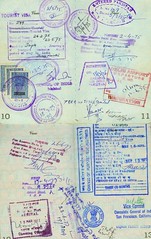 Traveling to Europe can be costly or cheap depending on your means and how you want to travel. First class travel is going to cost you a bundle, while traveling in budget class will save you a ton. Traveling frugally doesn’t mean you have to rough it. Travel to Europe these days can be quite affordable, more so than in the past. Seeing Europe, doesn’t have to be just a dream, but can become a reality.
Traveling to Europe can be costly or cheap depending on your means and how you want to travel. First class travel is going to cost you a bundle, while traveling in budget class will save you a ton. Traveling frugally doesn’t mean you have to rough it. Travel to Europe these days can be quite affordable, more so than in the past. Seeing Europe, doesn’t have to be just a dream, but can become a reality.
Airlines
Round-trip airline tickets to Europe are ranging from $1000 to $1500 during high season and can be as low as $500 during off season (September through May). Right now there are two competing airlines, Continental and U.S. Airways, which are undercutting most other airlines on many flight routes to European countries. If you dig around on the Internet a bit, you may come up with a good deal. There are many websites that have a feature which compares different airlines, different flight times and different routes all to your benefit. If you find a good deal, go ahead and lock it in, the further out the better, so you will be assured the price and a seat, and your departure won’t be impeded.
Travel Insurance
Travel insurance is quite inexpensive these days, so this is one cost you won’t have to stress about. If you’re booking ahead, trip cancellation insurance is a must. You don’t want to get stuck at the last minute being out all the vacation money you’ve invested because you had to cancel your travel plans. These cheap travel insurance policies will protect you for a number of covered reasons for trip cancellation. Being stuck with a huge emergency care bill will really stress you out, so make sure you get covered with (ravel medical insurance as well—just in case of an accident.
Lodging
Many European countries offer inexpensive hostels if you’re up for sharing space with strangers that range from luxurious to the barest of the bare for around $8 a night. If you prefer a bit more privacy and a more low key stay, you can get comfortable motel accommodations for around $120 a night during high season and even cheaper during off season. If you stay a bit away from the city center or historical areas the cost will always be much less, but you trade easy access for the lower cost.
Food
Just as there are large disparities in the cost of flights and lodging—the same can be said for food. Depending on the European country you are visiting and the way you like to eat, the cost will be reflective. Some people can eat on $20 a day in Turkey, while having to spend a $100 a day in France. If you are going to be spending more of your budget on lodging, then you may want to plan on spending less on nice meals out and go for a loaf of fresh bread, cheese and some fruit eaten in your room.









